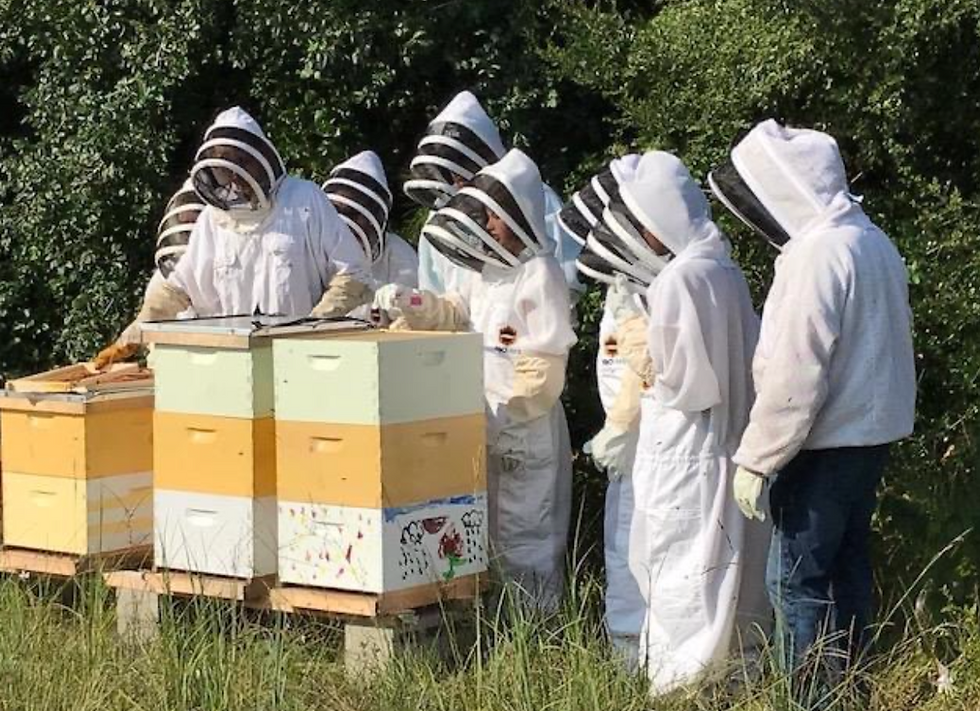Local Experts Urge Katy Families to Not Kill Bees; Seek Help in Beehive Removal
- Jun 23, 2023
- 4 min read
KATY MAGAZINE NEWS
June 23, 2023
By Natalie Cook Clark
Bugs that sting may make our skin crawl, but they benefit the Katy community. A Katy family found a beehive in their cable box and reached out for help rather than kill the bees.

Bees from the Katy High School Bee Keeping Club's hives. Photo credit: KISD
The Benefit of Katy Bees
We may run from their sting, but some bugs like bees truly benefit the Katy community and the world. Bees are the most common stinging bug that Katy families encounter. They emerge most frequently from late May through early October putting us in the season to find them. One Katy family has had them living in their Comcast cable box for the last few years.
“My 6-year-old got stung while on the trampoline, and I don’t want to hurt the bees,” says Katy resident Martha Sepulveda. “For safety they need to go.”

Beehive at the Sepulveda home cable box. Photo credit: Martha Sepulveda
The Beehive will be Removed, Not Killed
The Sepulveda family is working with a beekeeper to remove the bees. Bees are beneficial to the community. There are organizations and local beekeepers that can remove bees so they can keep helping the community.
The benefit and love of bees even inspired a Katy ISD club, the Katy High School Bee Keeping Club was founded in 2017. They used to remove beehives for Katy families but has since reached the capacity of their space and are no longer able to help in that way. Instead they educate the community on pollinator awareness and the best practices to preserve native plants.

The Katy High School Bee Keeping Club. Photo credit: KISD
“Bees and other pollinators are critical to the Katy community, providing food security for both local producers and residents,” says Kelly Knight, Katy High School teacher and supporting Beekeepers faculty sponsor.
According to Knight, scientists estimate that about 75% of the world’s flowering plants and about 35% of food crops depend on animal pollinators for production.
“Without pollinators, we would have to hand pollinate to get our favorite fruits and vegetables,” says Elizabeth Griss, Katy High School teacher and Beekeeper faculty sponsor.

Like most communities, beehives grow and often outgrow their space. This can result in what we see as swarming when the bees are searching for a place to expand or build a larger home or hive.
“It is not uncommon to see large masses of bees hanging from a tree, or building comb in the attic, utility box, or backyard shed,” says Knight.
While this can create a problem for Katy residents, Knight and Griss both urge residents to not spray bees or their hives, but to rather seek help in their removal. There are a number of trained local beekeepers and companies that can safely remove the hive.
The Sepulveda family is working with a beekeeper who is removing the beehive from their cable box for $150.
“The decline of bees poses a huge threat to our existence on this planet,” says Griss. “Some species of bees have made it to the endangered species list and although honeybees are not yet endangered, their populations are declining at an alarming rate due to pesticides, malnutrition, and chemicals in the environment.”
Katy Bees Are Not Aggressive
Knight stresses to Katy families to not be afraid of local bees. All bees native to the Katy-area: carpenter bees, mason bees and honeybees are not aggressive.
“If left undisturbed, these helpful pollinators are not bothersome; aggressive behaviors typically only occur if they feel that their brood or food source is being threatened,” explains Knight.

However, there are some stinging bugs in Katy that can be aggressive. Wasps, especially the red ones, can be aggressive. They are clearly distinguished from bees based on their appearance and they build single occupant nests out of paper or clay. These insects can prey upon beneficial bugs in your yard.
Non-Toxic Ways to Kill Wasps
There are easy non-toxic ways to eliminate wasps that can also protect the insects you want to keep. Instead of toxic poisons, residents can spray wasps with vinegar or dish soap. Residents can also apply a natural repellent to corners and crevices on the exterior of your home such as diluted water with cinnamon, citronella, bay leaves, basil, lemongrass, spearmint, coffee grounds, cloves.
A Connection with Bees
“My dad was a beekeeper before I was born and I’ve always known they were so important,” says Sepulveda. “Since he’s passed, I feel a connection to the bees and don’t want them harmed. I also don’t want my son stung or pay an exorbitant amount either.”
Another Katy family recently reported on social media a swarm of bees in their yard.
“The bees must have moved on, we didn’t use a service,” says Becky Holbrook. “I agree, they are very important to our future.”
Learn more about bees and their impact on the Katy community at the Katy High School Bee Keeping Club’s website.
#PrimroseSchools #Town&Country



